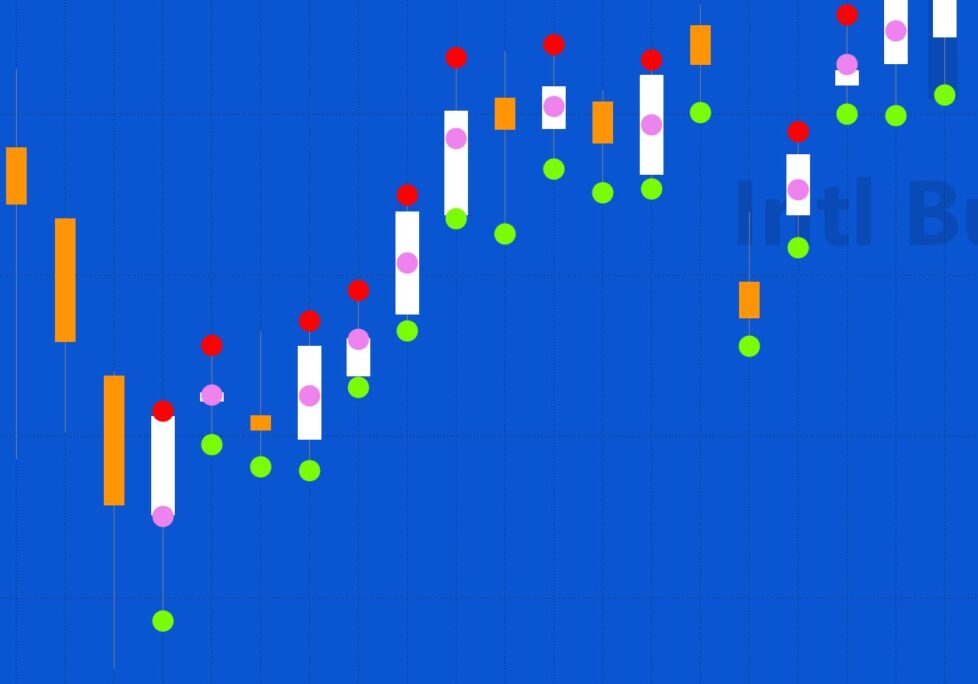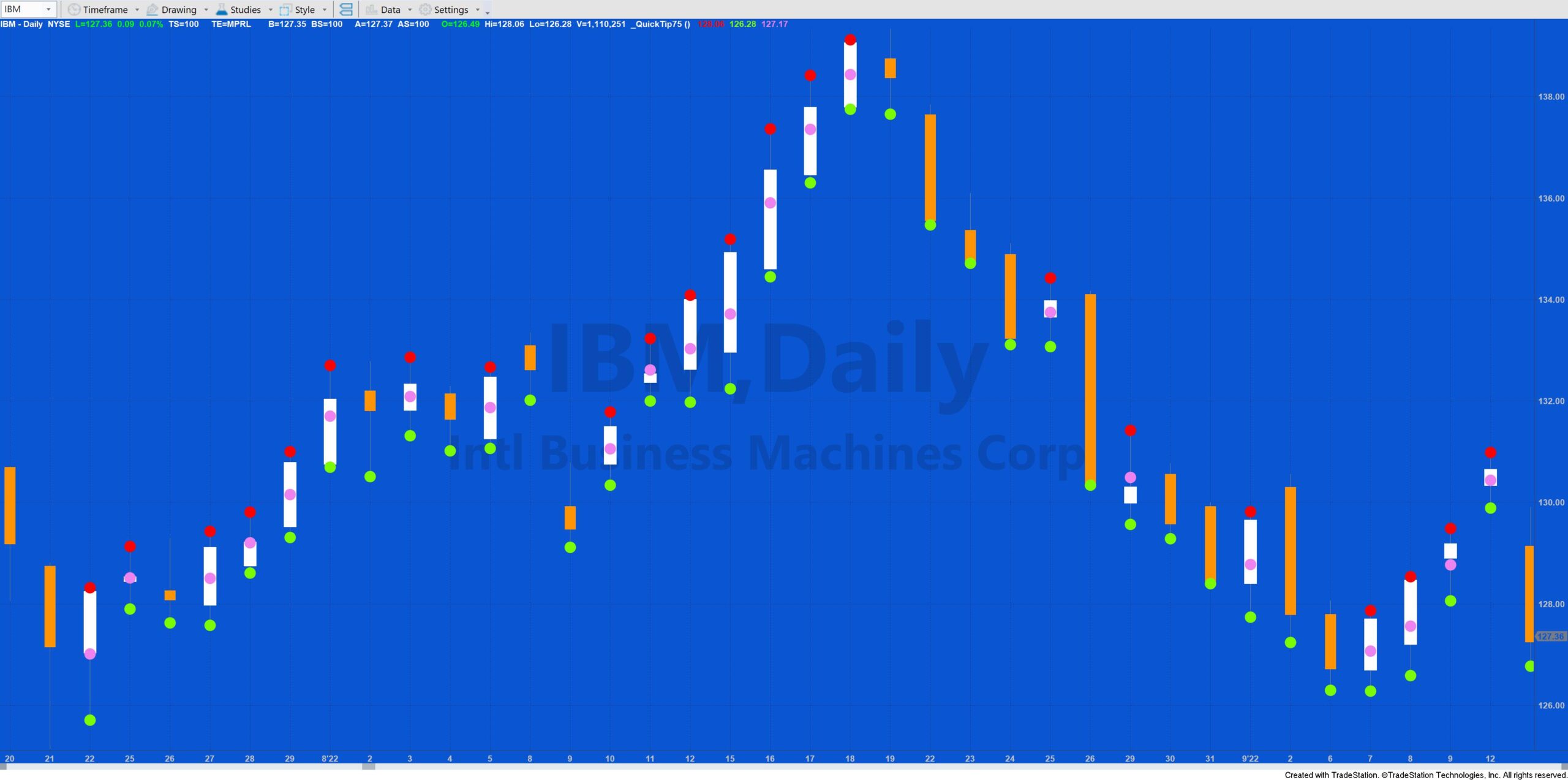
Quicktip 75 uses a TradeStation EasyLanguage show-me study to demonstrate the difference between:
Condition1 = Close > Open;
//and
If Close > Open then Condition2 = TRUE;
With the first expression (Condition1 = Close > Open;) if close is greater than open (i.e an up bar) the expression evaluates to true and Condition1 is set to TRUE, hence, in our simple example a show me dot is plotted at the high of the bar. If Close is less than or equal to open (i.e a down bar or Doji) then the expression, Close > Open evaluates to FALSE, Condition1 is set to False and the show-me dot is not plotted.
With the second expression, If Close > Open then Condition2 = TRUE; if the close is greater than the open (an ‘up’ bar) then Condition2 is set to true and a show-me dot is plotted at the low of the bar. If on a subsequent bar the close is less than or equal to open (i.e a down bar or Doji) then no change is made to Condition2. Hence once there has been an up bar Condition2 is set to true and remains true for all future bars and a show-me dot would be plotted at the low of these bars. This second expression acts as a sort of ‘ratchet.’
The third example is similar to the second in that if a bar is an ‘up’ bar then Condition3 is set to true, however if the bar becomes or is a down bar or Doji Condition3 is set to false. Therefore the first and third expressions give similar results.

Copy the quick-tip 75 TradeStation EasyLanguage code
You can copy the tutorial code below.
{ THIS SHOW ME STUDY IS PROVIDED IN THE HOPE THAT IT WILL BE USEFUL. HOWEVER, MARKPLEX CORPORATION ASSUMES
NO LIABILITY FOR ANY DAMAGES, DIRECT OR OTHERWISE, RESULTING FROM THE USE OF THIS INFORMATION, AND NO WARRANTY
IS MADE REGARDING ITS ACCURACY OR COMPLETENESS. USE OF THIS INFORMATION IS AT YOUR OWN RISK. THIS SHOW ME
STUDY AND ASSOCIATED TECHNIQUES IS AN EXAMPLE ONLY, AND HAS BEEN INCLUDED SOLELY FOR EDUCATIONAL PURPOSES.
MARKPLEX CORPORATION DOES NOT RECOMMEND THAT YOU USE ANY SUCH TRADING STRATEGIES, INDICATORS, SHOWME
STUDIES, PAINTBAR STUDIES, PROBABILITYMAP STUDIES, ACTIVITYBAR STUDIES, FUNCTIONS (OR ANY PARTS THEREOF)
OR TECHNIQUES. THE USE OF THIS SHOW ME STUDY DOES NOT GUARANTEE THAT YOU WILL MAKE PROFITS, INCREASE PROFITS,
OR MINIMIZE LOSSES.}
{ Quicktip 75 uses a TradeStation EasyLanguage show-me study to demonstrate the difference between:
Condition1 = Close > Open;
and
If Close > Open then Condition2 = TRUE;
With the first expression (Condition1 = Close > Open;) if close is greater than open (i.e an up bar)
the expression evaluates to true and Condition1 is set to TRUE, hence, in our simple example a show
me dot is plotted at the high of the bar. If Close is less than or equal to open (i.e a down bar or
Doji) then the expression, Close > Open evaluates to FALSE, Condition1 is set to False and the
show-me dot is not plotted.
With the second expression, If Close > Open then Condition2 = TRUE; if the close is greater than the
open (an 'up' bar) then Condition2 is set to true and a show-me dot is plotted at the low of the bar.
If on a subsequent bar the close is less than or equal to open (i.e a down bar or Doji)then no change
is made to Condition2. Hence once there has been an up bar Condition2 is set to true and remains true
for all future bars and a show-me dot would be plotted at the low of these bars. This second
expresssion acts as a sort of 'ratchet.'
The third example is similar to the second in that if a bar is an 'up' bar then Condition3 is set to
true, however if the bar becomes or is a down bar or doji Condition3 is set to false. Therefore the
first and third expressions give similar results.
For more information about quick-tip 75 see:
/}
// ******************************************************************************************************************************
// 1. Condition1 = Close > Open;
// ******************************************************************************************************************************
Condition1 = Close > Open;
If Condition1 = TRUE then Plot1( H );
// ******************************************************************************************************************************
// 2. If Close > Open then Condition2 = TRUE;
// ******************************************************************************************************************************
If Close > Open then Condition2 = TRUE;
If Condition2 = TRUE then Plot2( L );
// ******************************************************************************************************************************
// 3. If Close > Open then Condition3 = TRUE Else Condition3 = FALSE;
// ******************************************************************************************************************************
If Close > Open then Condition3 = TRUE
Else Condition3 = FALSE;
If Condition3 = TRUE then Plot3( ( H + L ) / 2 );
{ ** Copyright (c) 2022 Markplex Corporation. All rights reserved. **
** Markplex Corporation reserves the right to modify or overwrite this analysis technique
on its https://markplex.com Web site. ** }

